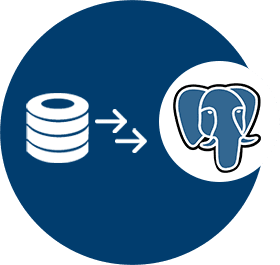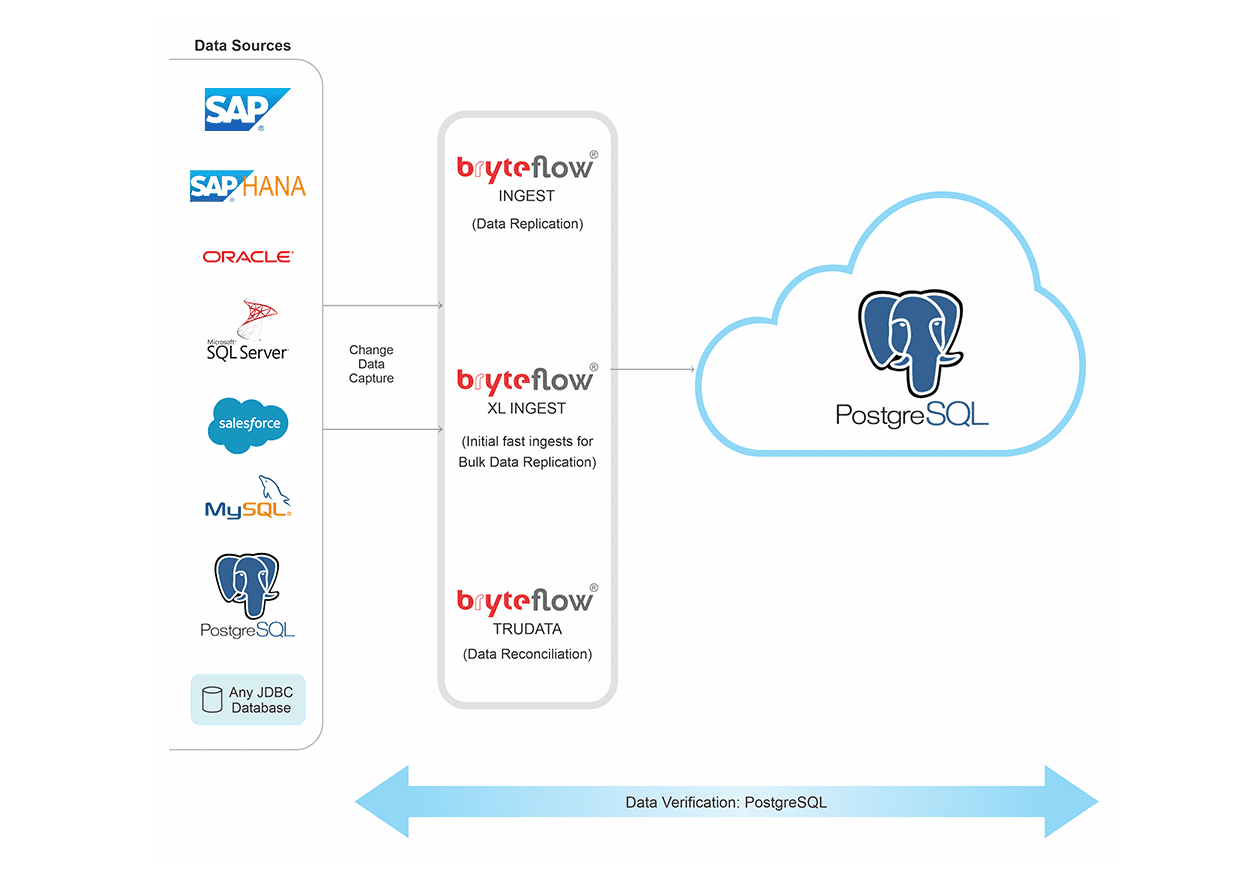PostgreSQL Connections
Oracle to Postgres CDC in Real-time
Oracle to Postgres Migration is completely automated with BryteFlow
Migrate data from Oracle to Postgres in real-time with BryteFlow. It uses no-code, log-based Change Data Capture to load data from Oracle to PostgreSQL, delivering data that is ready to use in your Postgres data warehouse. Every change at source including inserts, updates and deletes are merged automatically with existing data to keep data updated with source. All processes are automated, including extraction, SCDtype2, masking, or DDL. GoldenGate CDC and a better alternative
Load large volumes of data from Oracle to Postgres easily
Our Oracle Postgres migration tool enables movement of large data volumes with multi-threaded parallel loading, smart partitioning and compression for the initial full refresh of data. This is followed by loading of incremental data changes using log-based CDC. BryteFlow provides automated data reconciliation and supports all versions of Oracle for replication to Postgres including Oracle 12c,19c and 21c.
BryteFlow’s Oracle CDC Replication
Oracle to Postgres Migration Tool Highlights
- BryteFlow’s Oracle to Postgres CDC replication has zero impact on source. Oracle to Redshift Migration Made Easy (2 Methods)
- Fast, multi threaded, parallel loading from Oracle to Postgres for initial full refresh.
- Postgres replication best practices built into the software. Oracle to Azure Cloud Migration (Know 2 Easy Methods)
- BryteFlow is at least 6x faster than GoldenGate and much faster than HVR and Qlik Replicate.
- Oracle to Postgres replication with zero coding for extraction, merging, masking or type 2 history.
- Automates Data Reconciliation with row counts and columns checksum.
- Supports high volume ingestion of Oracle data to Postgres, both initial and incremental. Why Your DBA Will Love Oracle Autonomous Data Warehouse
- Availability and high throughput – approx. 1,000,000 rows in 30 seconds. About Oracle to Postgres Migration
- BryteFlow Ingest supports replication to Amazon Aurora Postgres on AWS. Oracle to Snowflake: Everything You Need to Know
- BryteFlow provides replication support for all Oracle versions, including Oracle 12c, 19c, 21c and future releases for the long term.
Suggested Reading:
Oracle CDC (Change Data Capture): 13 things to know
Aurora Postgres and How to Setup Up Logical Replication
Oracle to SQL Server Migration: Reasons, Challenges and Tools
Oracle to Snowflake: Everything You Need to Know
Real-time, No-Code Oracle to Postgres Migration using CDC
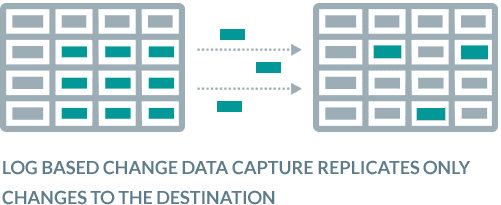
BryteFlow uses real-time, log-based CDC to replicate changes from the Oracle source to Postgres
BryteFlow uses zero-impact log-based Change Data Capture to sync data with changes at source in real-time. Every insert, delete and update is merged automatically with existing data to keep data continually updated. CDC to Postgres can be continuous or you can specify a frequency for it to happen.
AWS DMS CDC and limitations for Oracle Replication
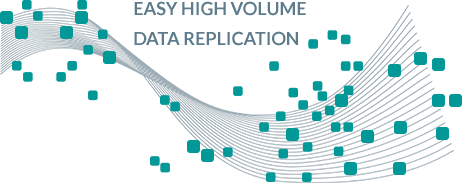
BryteFlow replicates huge volumes of Oracle data to your Postgres database fast
When you have heavy Oracle datasets to load to Postgres, BryteFlow makes it effortless. BryteFlow uses parallel multi-threaded loading and partitioning to load data at high speeds. BryteFlow XL Ingest handles the initial full refresh of Oracle data to Postgres at high throughput of approx. 1,000,000 rows in 30 seconds.
Oracle CDC (Change Data Capture): 13 Things to Know
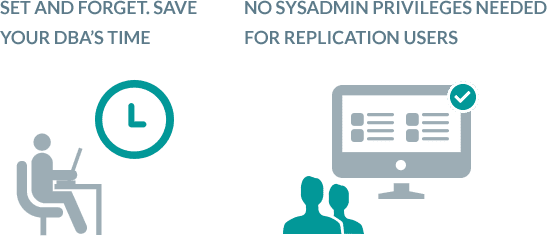
Time spent on managing the Replication is minimal for Database Administrators
Spare your DBA’s time -they usually spend a lot of time managing backups, managing dependencies until the changes have been processed, in configuring full backups etc.
With BryteFlow, it is “set and forget”. There is no involvement from the DBAs required on a continual basis, hence the TCO (Total Cost of Ownership) is much lower. Further, you do not need sysadmin privileges for the replication user, which is usually the case in most replication scenarios.
BryteFlow for Oracle CDC
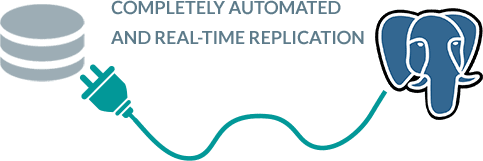
Oracle to Postgres Migration Tool is completely automated
BryteFlow functions as a fully automated Oracle to Postgres migration tool. With other Oracle to Postgres migration tools there is some coding involved for e.g. to merge data for basic Oracle CDC. With BryteFlow you get full automation. Oracle data replication, data merges, SCD Type2 history, data transformation and data reconciliation are all automated and self-service with a user-friendly interface that ordinary business users can handle with ease.
Oracle to Postgres Migration (The Whys and Hows)
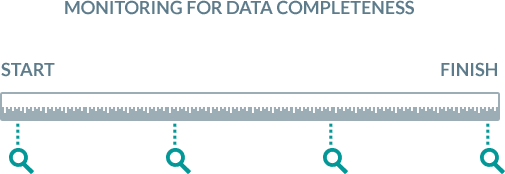
Oracle to Postgres Data Replication is monitored end to end
BryteFlow monitors your data replication from Oracle to Postgres from start to finish. BryteFlow makes it a point to track your data. For e.g. if you are replicating Oracle data to Postgres at 5pm on Thursday, May 7, 2022, all the changes that took place till then will be replicated to the Postgres database, latest change last, so the data will be updated with all inserts, deletes and changes existing at source. The changes are merged automatically with existing data.
Oracle to SQL Server Migration: Reasons, Challenges and Tools

Data maintains Referential Integrity
With BryteFlow you can maintain the referential integrity of your data when migrating data from Oracle to Postgres. This means when there are changes in the Oracle source and when those changes are replicated to the destination (Postgres) you can pinpoint what changed exactly – the date, the time and the values that changed at the columnar level.
Aurora Postgres and How to Setup Up Logical Replication

Data is continually and automatically reconciled and checked for completeness in the Postgres cloud data warehouse
With BryteFlow, data in the Postgres data warehouse is validated against data in the Oracle database continually or you can select a frequency for this to happen. It performs point-in-time data completeness checks for complete datasets including type-2. It compares row counts and columns checksum in the Oracle database and Postgres data at a very granular level. Very Postgres integration software provide this feature.
About BryteFlow TruData, our Data Reconciliation Tool

Archive data while preserving SCD Type 2 history
BryteFlow provides time-stamped data and the versioning feature allows you to access data from any point on the timeline. This versioning feature is integral to historical and predictive trend analysis.
Oracle to Azure Cloud Migration (Know 2 Easy Methods)

Remote log mining for Oracle data
With BryteFlow you can use remote log mining for Oracle data. The logs can be mined on a completely different server therefore there is zero load on the source. Your operational systems and sources are never impacted even though you may be mining huge volumes of data.
Oracle to Redshift Migration Made Easy (2 Methods)
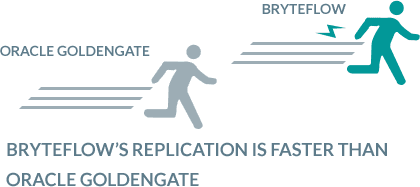
Data replication 6x faster than Oracle GoldenGate
BryteFlow replication of data is 6x faster than GoldenGate’s for initial and incremental data and also much faster than Qlik Replicate and HVR. This is based on actual experience with a client. Try out BryteFlow for yourself and see exactly how fast it works to migrate your Oracle data to Postgres.
Oracle GoldenGate CDC and a better alternative

Automatic catch-up from network dropout
BryteFlow has built-in resiliency. In case of a power outage or network failure you will not need to start the Oracle to Postgres replication process over again. You can simply pick up where you left off – automatically.
Oracle to Snowflake: Everything You Need to Know

About Oracle
Oracle DB is also known as Oracle RDBMS (Relational Database Management System) and sometimes just Oracle. Oracle DB allows users to directly access a relational database framework and its data objects through SQL (Structured Query Language). Oracle is highly scalable and is used by global organizations to manage and process data across local and wide area networks. The Oracle database allows communication across networks through its proprietary network component.
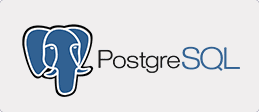
About PostgreSQL
PostgeSQL is an open source, enterprise-grade, relational database management system based on SQL. It extends SQL to cover and scale complex data workloads. Postgres is known for its versatility, extensibility, reliability and data integrity, not to mention its amazing features. It can be run on all prominent operating systems and is ACID-compliant. Postgres innovative add-ons include the useful PostGIS geospatial database extender. Postgres enables users to define their own data types and create custom functions.

